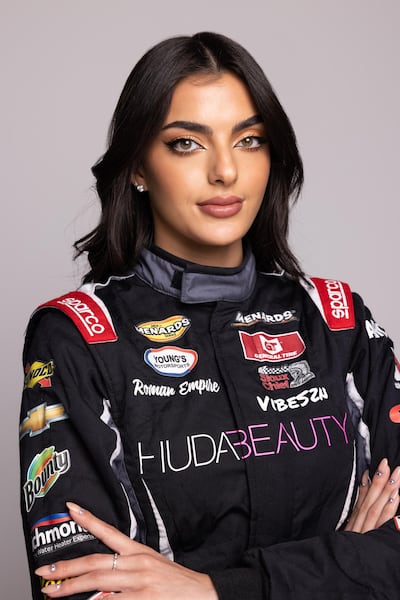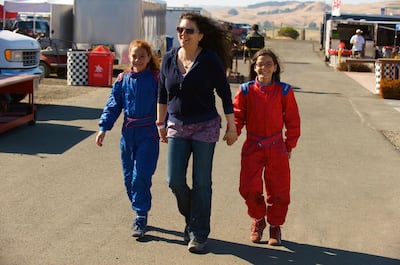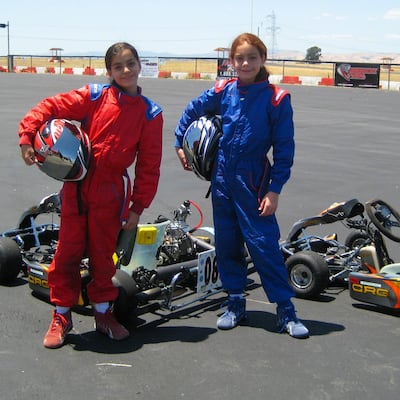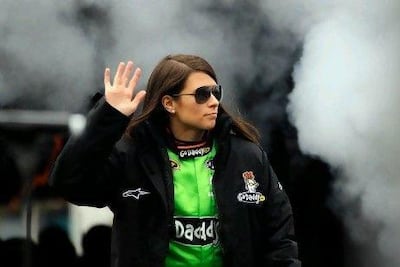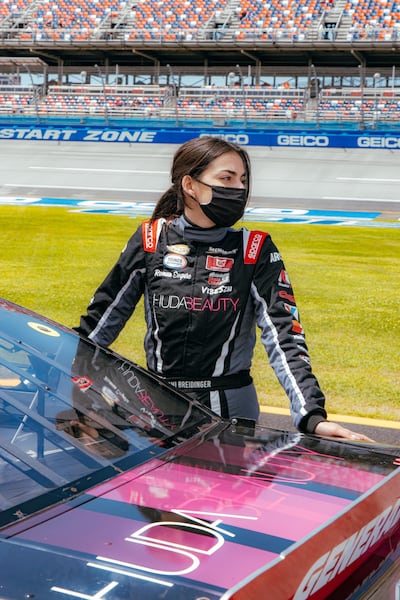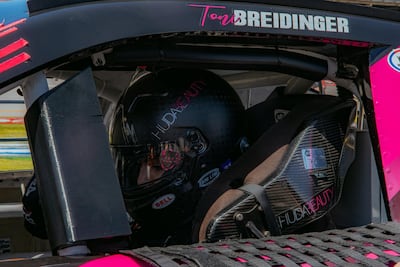Toni Breidinger may be climbing the ranks of one of the most hyper-masculine sports in the world, but she’s still a self-proclaimed “girly girl”. And that’s only part of the dichotomy that makes her story so alluring.
“I definitely feel like I’m two different people,” she says. “Whenever I tell anybody that I’m a race car driver, they always think it’s a joke. I’ve literally had people just start laughing.”
But those who underestimate her do so at their peril. This year, Breidinger, 21, whose mother is Lebanese, became the first Arab-American female driver to participate in a Nascar national series when she made her debut at the famed Daytona International Speedway in Florida.
She is also a 19-time US Auto Club race champion, the most victories ever for a woman, and has her own line of branded merchandise. She currently competes in the Arca Menard series, but has her sights firmly set on the Nascar Cup series, which, as the top tier of stock car racing, she likens to “the Formula One of Nascar”.
She is focused, a ferocious competitor and completely committed to chasing her dreams – at speeds of up to 300 kilometres per hour.
“When I’m in a race car, I just flip a switch in my head,” she says. “I feel like I’m a very calm and chill person in real life, but once you get into a race car, you have to just change into being aggressive and reacting super-fast. So as soon as I’m in the car and the engine is on, I’m a whole different person.”
She describes her driving style, honed over the past 12 years, first in go-karts, then in open-wheel and finally stock cars, as highly calculated.
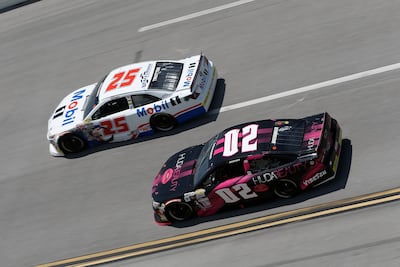
“If I’m behind someone, I’m always trying to plan the next move – where are their weaknesses, where am I catching them, where can I pass them? So for me, I’m always thinking when I’m in the race car. There’s never a time when I do something just to do it.”
Breidinger grew up in Hillsborough, California, and while she has never been to Lebanon, she says she feels strong links to that part of her heritage. Having moved away from the family home to settle in Charlotte, North Carolina, a Nascar hub, she says one of the things she misses most is her mum’s Lebanese cooking.
“My mum really taught us about the culture growing up. I feel really connected to that side of me.”
Her love of motor sports can be traced back to an impromptu visit to a go-kart track when she was only 9 years old. Her father took her and her twin sister, Annie, for a fun day out, little knowing that the activity would become something of an obsession for both his daughters. He ended up buying them their own go-kart and then, when they started arguing about who would drive it first, their second.
Both girls became increasingly competitive and started racing, driving go-karts for more than a decade before moving into race cars. When the time came to decide between college and cars, Annie chose the former, while Toni has stuck firmly with the latter.
She loves the competitive element of the sport. "You also get that adrenalin rush, but I'm not an adrenalin junkie, which is kind of funny – I'm scared of roller coasters and all that other adrenalin junkie stuff, but I just love how competitive racing is," Breidinger explains.
"I love doing things that are out of the norm and different.”
While she is conscious of the fact that she is shattering stereotypes and breaking barriers by her mere presence in the notoriously male-dominated Nascar, it is not something that she focuses on too much.
“I don’t really try to break any barriers or stereotypes; I just try to be myself and do my thing,” she says. “It’s cool if I am doing that; it’s amazing when people reach out saying that I inspire them. It’s not my intention … but it’s amazing that I’ve gotten all this support.”
Nascar can have an uneasy relationship with its female stars. Breidinger cites Danica Patrick as one of the women she admired when she was growing up, but despite being the most successful woman in the history of American open-wheel racing, and the only female to win an IndyCar Series race, Patrick’s career was plagued by criticism that her looks and considerable media profile far outweighed her actual sporting prowess.
Many wrote her off as little more than a marketing gimmick, dubbing her the Anna Kournikova of motor sports.
“Growing up, Danica Patrick was the biggest female in racing, so she was an easy one to look up to," Breidinger explains. "People can say what they want to say about her, but no matter what, she definitely paved the way for us.”
The young driver has always asserted that the race track doesn’t recognise gender or ethnicity, and that once their helmets are on, she and her male competitors are all simply drivers. But while the race track may present an even playing field, that’s not always the case when it comes to the industry surrounding it.
“I have been treated differently,” Breidinger admits. “Every race weekend I get some kind of comment or am treated differently in some way, but it’s something that I brush off, because I know what I’m there to do and I know I’m a driver just like anybody else. So I never let it get to me.”
Nonetheless, she acknowledges that getting sponsorship and funding, notoriously difficult in any competitive sport, may be more challenging because she is a woman.
“Racing is a pay-to-play sport; it’s not like you can just show up. You need funding for it, and sometimes as a female, it’s a little bit harder to gain that respect and have people believe in you and want to invest in helping you go up the ranks. So moving up in the sport, I think that’s one of the things that’s been holding me back.”
Which is one reason why recent support from fellow Arab-American Huda Kattan, founder of Huda Beauty, was so appreciated. The UAE brand sponsored Breidinger’s participation at the General Tire 200 series at Talladega Speedway in April.
To mark the occasion, Breidinger's car – an 02 Chevrolet SS – was repainted with a pair of hot-pink lips emblazoned across the bonnet, and racing stripes to match. This overtly feminine visual messaging was a delightful incongruity on the testosterone-heavy race track, and a fitting symbol of Breidinger's own positioning in the sport.
The partnership also had personal resonance for Breidinger. “When I was younger, I used to make little fake YouTube make-up tutorials and I used to watch Huda’s tutorials and also use her make-up, so it was such a dream come true to have her on my car. It means a lot that she wants to support me and she believes in me.” The appreciation is, by all accounts, mutual. “Toni Breidinger is setting an incredible example for people around the world,” says Kattan. “I am in awe of her accomplishments and so excited to watch her grow and continue to break barriers. It was a no-brainer for us to want to support her ... she is an absolute rock star."
Talladega was Breidinger’s second superspeedway race, and she placed a respectable 12th. At this point in her career, she views every competition as an opportunity to learn and hone her craft.
“At Talladega, the biggest thing I learnt was drafting. I don’t have that much experience with drafting. It’s not something I’ve done much before on the short tracks, it’s more of a thing on the bigger tracks," she says. "But also just the little things, like shifting correctly on the restarts and more about the race craft and the handling of the car.
"Every weekend, I learn more about the changes on the car that the team is making, so I can understand the car a little better.”
Off the track, Breidinger is focusing on building her self-confidence. “For me, I feel like being successful comes down to believing in yourself and knowing that you can do it. Having self-confidence and knowing that what you do changes your outcome. You are in control," she says.
“Racing is a hard dream to chase. You don’t really know if it’s going to work out. It’s a long journey. I’ve been doing this for 12 years and there are still times when I think: ‘I don’t know if this is going to work out for me.’ But I’m too stubborn to stop.”

